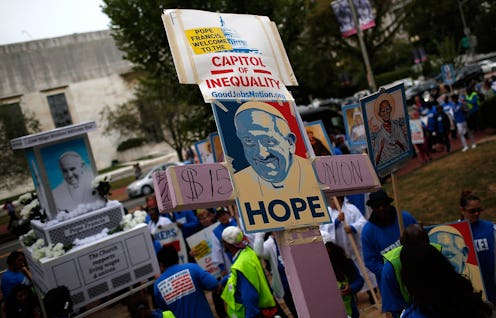News
The Similarities Of Pope Francis & Bernie Sanders
Presidential candidate Sen. Bernie Sanders made a historic trip to the Vatican this week, briefly interrupting his campaign stumping ahead of Tuesday's New York primary. As a Jewish man from Brooklyn, Sanders' invitation to speak at a conference in Vatican City may have seemed unusual and unexpected, but Bernie Sanders has more in common with Pope Francis than most U.S. politicians. Sanders may even be the pontiff's closest political ally in the United States.
Sanders spoke on Friday at an international academic conference sponsored by the Pontifical Academy of Social Sciences, an academic body that advises the pope. Although the Vatican press office initially said there would be no meeting between Sanders and Francis, the two men reportedly had a brief conversation at the Vatican Saturday morning. Sanders told CBS News correspondent Seth Doane that the meeting with Francis was not political.
"If I was really being political, I'd be in New York City right now and not in Rome," Sanders told CBS News. "For me, the issues that the pope is talking about are issues that I've been talking about for many, many years."
The candidate, a self-identified Democratic socialist, is not necessarily lying. But the two high-profile leaders, though of different faiths, share the same political views when it comes to income inequality and climate change.
Hailed as a stunning progressive, Francis has been a perplexing figure for Catholics and non-Catholics alike. The pontiff is a harsh critic of capitalism — something that hasn't played well with American conservatives. Several Republican members of Congress boycotted Francis' address to the joint session of Congress last September, accusing the pontiff of being anti-capitalist.
While Francis did praise capitalism when addressing Congress last fall — he specifically noted the "spirit of enterprise" and highlighted how business has the power to produce wealth — he warned that capitalism must not suppress those in poverty. "I would encourage you to keep in mind all those people around us who are trapped in a cycle of poverty," Francis said in September. "They too need to be given hope. The fight against poverty and hunger must be fought constantly and on many fronts, especially in its causes."
But Francis' address to Congress seemed to be a diluted version of his ideology. In the past, Francis — who's been largely inspired by liberation theology, a school of thought which critics say has overly Marxist leanings — has openly chastised capitalism's influence on the world. In an interview with the Italian newspaper La Stampa in January 2015, Francis said:
I recognize that globalization has helped many people rise out of poverty, but it has also damned many others to starve to death. It is true that global wealth is growing in absolute terms, but inequalities have also grown and new poverty arisen
What I have noticed is that this system sustains itself through a culture of waste, which I have already discussed various times. There is the politics, the sociology and even the attitude of waste.
When money, instead of man, is at the center of the system, when money becomes an idol, men and women are reduced to simple instruments of a social and economic system, which is characterized, better yet dominated, by profound inequalities.
Meanwhile, Sanders directly condemned capitalism in his address at the Pontifical Academy of Social Sciences conference in Vatican City on Friday. The Vermont senator, who's been wielding his extreme progressivism over Democratic challenger Hillary Clinton during this campaign season, expanded on his platform to reform higher education, banking regulations, and overall income distribution in the United States and beyond. Sanders said the world has been "left with an economy operated for the top 1 percent, who get richer and richer as the working class, the young and the poor fall further and further behind."
As we already know, income inequality is at the top of Sanders' campaign platform, which includes plans to raise the federal minimum wage, implementing single-payer health insurance, and creating a progressive estate tax. Sanders even quotes Francis on his campaign website.
For both Sanders and Francis, capitalism is tied to climate change. The pontiff rattled the globe in 2015 when he released his encyclical on climate change, Laudato Si. The 184-page encyclical condemned what Francis calls "the culture of waste" and urged world leaders to take action against damaging environmental practices. In his encyclical, Francis builds upon the teachings of his namesake St. Francis, patron saint of animals and ecology.
But the encyclical is also noteworthy for the equal attention Francis gives to economic factors, global poverty and technology. Francis further condemned wealthy developed countries for using less-developed countries for profit:
The foreign debt of poor countries has be come a way of controlling them, yet this is not the case where ecological debt is concerned. Indifferent ways, developing countries, where the most important reserves of the biosphere are found, continue to fuel the development of richer countries at the cost of their own present and future. The land of the southern poor is rich and mostly unpolluted, yet access to ownership of goods and resources for meeting vital needs is inhibited by a system of commercial relations and ownership which is structurally perverse. The developed countries ought to help pay this debt by significantly limiting their consumption of non-renewable energy and by assisting poorer countries to support policies and programmes of sustainable development.
Here, Sanders would also agree with Francis. Sanders made some of his strongest statements on climate change and its relation to economic wealth at Thursday's Democratic debate. "Incrementalism and those little steps are not enough. Not right now. Not on climate change," Sanders said, criticizing Clinton's position.
"We have got to lead the world in transforming our energy system, not tomorrow, but yesterday," Sanders added."And, what that means, Wolf, it means having the guts to take on the fossil fuel industry."
